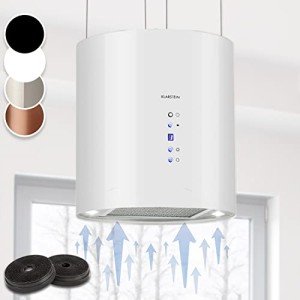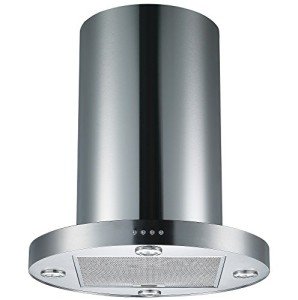Five Killer Quora Answers On Extractor Fan Kitchen Island
ліёл¬ё
Island Hoods: An Overview of Their Purpose, Styles, and Benefits
Island hoods have actually ended up being a popular option in contemporary kitchen design, serving both functional and visual purposes. As the focal point of lots of extractor fan kitchen island (enquiry) areas, these flexible ventilation systems not only help remove smoke, smells, and heat however likewise improve the overall atmosphere of the area. This short article explores the various types of island hoods, their advantages, setup factors to consider, and upkeep needs.

What is an Island Hood?
An cooker island hood is a type of range hood for island hood that is suspended above a kitchen island, normally where a cooktop lies. Unlike wall-mounted range hoods that are connected to a wall, island hoods are developed to be installed from the ceiling, enabling a smooth, inconspicuous appearance while offering reliable ventilation.

Benefits of Island Hoods
Island hoods feature a number of benefits that elevate both the functionality and aesthetic appeals of a kitchen. Here are some key benefits:
1. Improved Ventilation
Island hoods stand out at efficiently recording smoke, steam, and airborne grease generated while cooking. They ensure that the kitchen remains fresh and without undesirable odors.
2. Aesthetic Appeal
Offered in various designs, colors, and materials, island hoods work as a centerpiece in the kitchen. They can match the overall style theme, adding visual interest and elegance.
3. Variety of Designs
Island hoods are readily available in many designs, from conventional to contemporary, enabling homeowners to pick one that matches their taste and kitchen design.
4. Boosted Cooking Environment
By removing excess heat and humidity, island hoods develop a more comfortable cooking area.
5. Increased Home Value
Upgrading to a modern-day island kitchen extractor hoods hood can include worth to a home, appealing to prospective buyers who focus on kitchen visual appeals and functionality.
Kinds Of Island Hoods
black island cooker hoods hoods can be found in different styles and performances. Here are some popular types:
| Type of Island Hood | Description | Pros | Cons |
|---|---|---|---|
| Ducted | Ventilation system connected to external ducting. | Effective air elimination; suitable for heavy cooking. | Setup can be complicated; needs ductwork. |
| Ductless | Uses charcoal filters to clean and recirculate air. | Easier to install; no external venting needed. | Less effective for heavy cooking; requires regular filter replacement. |
| Wall-Mounted | Installed on a wall; can be used in an island with a cooktop versus a wall. | Versatile; can fit various kitchen layouts. | Restricted to cooktops against walls. |
| Downdraft | A retractable system that rises from behind the cooktop. | Space-saving style; discreet when not in use. | Less efficient than standard hoods for ventilation. |
Installation Considerations
Choosing and installing an island hood includes several crucial elements, including:
Ceiling Height: Ensure the hood is set up at the proper height. Usually, there ought to be between 30 to 36 inches above the cooktop.
Ducting vs. Ductless: Decide whether a ducted or ductless system is preferable based upon the kitchen design and building.
Ventilation Power: Measure the BTU (British Thermal Units) produced by the cooktop or range to determine the required CFM (cubic feet per minute) for correct ventilation. As a basic guideline:
- 300 CFMs for electric cooktops.
- 600 CFMs for gas cooktops.
Design and Size: Choose a design and size that matches the kitchen's total visual while guaranteeing it has the power to handle your cooking requires.
Electrical Requirements: Ensure that setup adheres to local structure codes, particularly relating to electrical and gas lines.
Maintenance of Island Hoods
Correct maintenance of island hoods is necessary for making sure effective operation and durability. Here are some upkeep ideas:
Regular Cleaning: Clean the outside and interior surfaces routinely to avoid grease buildup. Use proper cleaners based upon the hood's product (stainless-steel, glass, and so on).
Filter Replacement: For ductless hoods, replace charcoal filters every 3 to 6 months. Metal filters need to be cleaned every few weeks, depending on usage.
Examine Ductwork: For ducted hoods, regularly check the ductwork for any obstructions to keep air flow performance.
Professional Servicing: Consider having a professional examine and service the hood every year to ensure optimal performance.
FAQs
1. Are ducted or ductless island hoods much better?
Each type has its advantages. Ducted hoods are more efficient for heavy cooking as they vent air exterior, while ductless hoods are easier to install and can work well in areas without external ventilation choices.
2. What is the ideal height for installing an island hood?
The ideal height for mounting an island hood is normally between 30 to 36 inches above the cooking surface area to ensure optimum efficiency and security.
3. Do island hoods require professional setup?
While some homeowners might choose to set up island hoods themselves, employing a professional is recommended, particularly for Extractor fan kitchen island ducted models that need specialized setup.
4. How frequently do I need to clean the filters?
It is suggested to clean metal filters every 1-2 months and replace charcoal filters in ductless hoods every 3-6 months, depending upon use.
5. Can an island hood improve home worth?
Yes, setting up a modern and elegant island cookers hood can enhance the kitchen's appeal, possibly increasing the general value of the home.
Island hoods offer an unique mix of functionality and design, making them an attractive option for modern kitchens. Comprehending their types, advantages, installation factors to consider, and maintenance requirements can assist house owners make notified choices. With proper care, an island hood can serve as both a crucial device and a gorgeous centerpiece in any kitchen space.

лҢ“кёҖлӘ©лЎқ0
лҢ“кёҖ нҸ¬мқёнҠё м•ҲлӮҙ